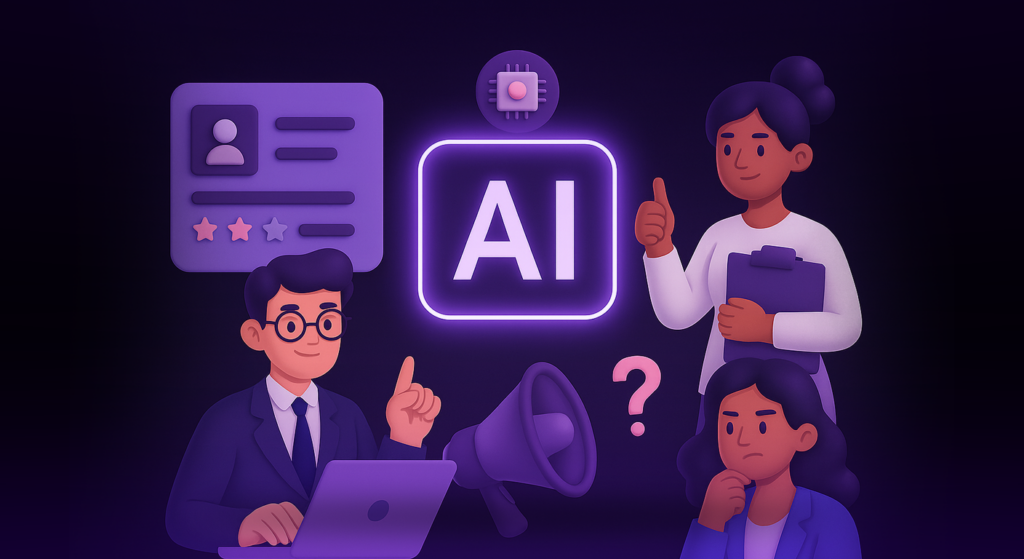If you’re in HR, then the chances of you being overwhelmed after spending hours upon hours screening candidate after candidate could be quite high. And for this, I’m sure you’ve started using candidate assesment tools such as an Applicant Tracking System (ATS) to make assessing candidates faster.
AI is now everywhere. And it hasn’t taken long for AI to sneak its many heads into candidate assessment tools as well. Assessing candidates is never an easy task. Recruiters spend many days a week on assessing candidates. It’s even worse for recruitment agencies. This is why many recruiters use candidate assessment tools to make life easier.
AI is currently playing a part in making many job functions easier and faster for humans. AI candidate screening is no different. Futuristic HR Managers and recruiters are already doing efficient candidate screening with AI as this minimizes the chances for mis-hires and missing out on qualified candidates.
Why use a candidate assessment tool?
Let’s face it. Humans are bound to make mistakes. And especially when you’re assessing candidates at a rate of hundreds of CVs per day, you’re going to skim past one or two of those CVs. What if the ideal candidate was behind one of those CVs.
Candidate assessment tools were designed to fix this issue. Instead of recruiters having to go through hundreds of resumes everyday, candidate assessment tools were able to qualify and score the applications based on the criteria given by the recruiter. Assessing candidates was done by the candidate assessment tool and all the recruiter had to do was go through the applications with the highest score.
But CVs don’t tell stories. Voices do. These traditional candidate assessment tools entirely depended on the information given in a candidate’s CV to qualify them. But if you ask most recruiters, assessing candidates only by their CVs is outdated by at least a few decades.
Assessing candidates is now harder than ever
As times progressed and the number of job seekers on the market got higher and higher, the tendency to oversell themselves on a CV became quite normal. Therefore traditional candidate assessment tools weren’t cutting it anymore.
What’s the solution? Assessing candidates is now about understanding them on a deeper level than what’s mentioned on the CV. What recruiters started doing was taking short screening calls to qualified candidates to understand them on a personal level and identify if their personality is a good fit for the company.
These screening calls now take up more time from recruiters than assessing candidates from their CVs did. Every screening call takes about 5 – 10 minutes and it’ll only take 20 screening calls to eat up half a working day. This is where AI Candidate screening comes in handy.
AI powered candidate assessment tools
As we already found out, voices can tell much better stories than CVs. And this is where AI comes in really handy. To minimize the time spent on taking screening calls, AI can now help you do a short voice interview, analyse personality, suitability for role and communication. This will give recruiters a clearer idea of whether or not the candidate is a good fit for the role.
And you may think that job seekers might have a negative reaction towards being forced to talk with an AI. But that’s not the case at all. With AI powered candidate assessment tools, the job seeker gets the power to pick a convenient time and a place to sit for their interview. Otherwise, when most recruiters take screening calls, qualified candidates are already at work and they might not get the opportunity to speak freely.
With AI candidate screening, not only can you screen hundreds, if not thousands of candidates in less than 5 minutes, but you can give more freedom and flexibility for your candidates. An efficient candidate screening with AI could give recruiters more opportunity to prepare and train the AI to ask specific questions related to the role they’ve applied for. This not only saves time for recruiters, but also for team leaders and department heads, who otherwise will have to sit in on screening calls and interviews to gauge domain knowledge of candidates.
Wrapping up
As we discussed, the recruitment has come far from the days when we used to send CVs in the post. Now companies rarely accept CVs in emails. Most companies require job seekers to apply through candidate assessment tools such as an Applicant Tracking System (ATS) to make the recruitment process easier and more efficient.
With AI sneaking its way into almost all walks of life, it was only a matter of time until it made it’s way into the recruitment space. Best recruitment agencies and the most efficient HR teams around the world are already assessing candidates with AI candidate screening. This means that those who don’t utilise methods of efficient candidate screening with AI will only fall behind.
With AI candidate screening, you can now even set up specific job scenarios to assess how candidates would perform in high-pressure situations. Not utilising these new candidate assessment tools will mean your HR team continues to waste time and company resources by using traditional hiring methods.


